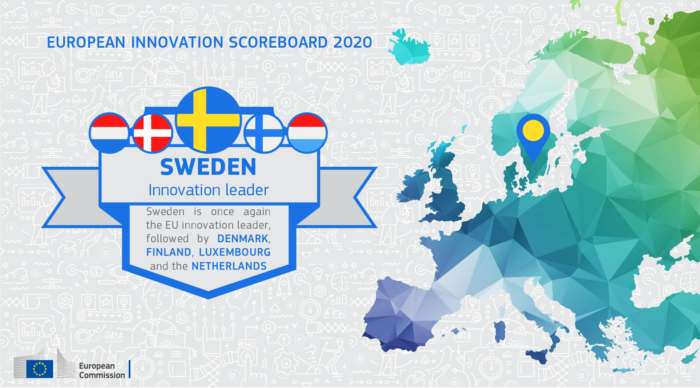This year’s European Innovation Scores are out. Sweden is once again the innovation leader, closely followed by Finland, Denmark, the Netherlands and Luxembourg. But while these countries score high on innovation, they do not seem to be very effective when it comes to selling their tech products and services. Why is this, and how can they solve this problem?
The European Innovation Scoreboard ranks the innovativeness of European countries using measures such as doctorate graduates, venture capital expenditure and innovation collaborations. The Nordic countries, the Netherlands and Luxembourg have the highest overall score, but all of these innovation leaders rank below the European average in a dimension called “sales impacts” which includes high-tech product exports, knowledge-intensive services exports and sales of new-to-market and new-to-firm product innovations.
Although all the countries operate in the common European market and sales possibilities should be very similar, a lot of local differences still exist. Jonne Mäkikyrö, business developer at Aexus comments: “Being from Finland and having spent years in Sweden, I can attest to the inherent risk aversion and modest sales attitude often found in the Nordics. The Nordic market can be a bit inward facing, and not very comfortable with a strong international expansion to the rest of the Europe.”

However, he acknowledges the Netherlands and Luxembourg struggle with sales impact as well, despite being very much integrated into the European markets. “I think the low sales score also has to do with the fact that selling new and innovative products can be difficult in general. Having an environment that is great for producing new innovations does not directly translate into the ability of taking the new products to market. These require a different skillset.” Meanwhile, Eastern and Southern European countries, which score well below the Nordics, the Netherlands and Luxembourg in overall innovation, rank very high in Sales Impacts.
Different types of innovative sales
Hugo Hollanders, the leader of the research team behind the scoreboard, and a senior researcher at Maastricht University, notes that there can be multiple reasons for the differences in sales impact scores across the European countries.
The first reason might be a simple reporting bias. Hollanders comments that respondents in Southern and Eastern Europe might be more inclined to answer that sales were due to innovative products. This means that the Nordics might be overly humble and have a high barrier on attributing a sale to the innovativeness of their product.
However, there could be much more to this than simple bias. “Less innovative countries tend to have more product innovations that were new to the firm and thus already existed elsewhere in the market.” Hollanders continues. In other words, while less innovative countries are much better at introducing new innovations to their companies, they did not necessarily create those innovations in the first place. This company level adoption of innovation elevates their sales impact score significantly.

It seems that a lot of the innovation activities in less innovative countries are related to the assembling of the products while the Nordics, the Netherlands and Luxembourg perform a lot of the initial research.
In brief, the Innovation Leaders introduce a lot of the new products and services to the market, but they are not as good in introducing the products to their own companies. At Aexus we theorize that this could be related to points of improvement in the sales process.
Solving this problem
Selling a new technology to another company or expanding to new countries with your offering can be quite hard. Creating an innovative product or service does not mean that the company is automatically good at selling it. Especially in the international markets. Every new market requires its own specific approach, as the innovation report implies. Adapting the offering for a new market involves more than a simple translation of the user manual.
Translating relevant content is part of the task, but in the end it is quite meaningless if you are not able to communicate the right unique selling points. Therefore, local experts can help decide which properties and benefits are best emphasized, and which are not. Beyond the language and the emphasis of different product benefits, there are a lot of other factors as well.
A local network
In order to succeed in international sales, companies need local market expertise and a local team of highly experienced professionals with
- a proven track record of sales in relevant verticals;
- a vast network of key executives and decision makers in prospect companies;
- a strong, effective and methodological approach
These are all things companies can find at Aexus. We have a long history of helping companies from inside and outside of Europe with their international sales outsourcing. Perhaps we can help the adoption rate of your innovative product. Please get in touch to find out what we can do for you.
